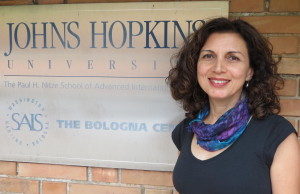by Shirin Khosropour, USA/Iran
The rain came down fast and we welcomed this change in the weather. On this Monday of our third week, some braved the rain to walk the 20-minutes to the John’s Hopkins SAIS Bologna Center as usual and some of us divided up into taxis. By now it’s easy to fall into step with any one of the other participants and walk …to the SAIS Center, to lunch, to the Coop supermarket, to plan a weekend trip with whomever wants to go, or to deftly—diplomatically—avoid doing any of the above!
We are people of different nationalities, genders, ages, and backgrounds, but we share a passion for peacebuilding and a keen interest in our world, and our world is huge—it’s the whole globe.
 We have shared a lot of experiences over the past two weeks—has it really been only two weeks? We are not afraid to get a little uncomfortable as we plod through this work. This is a group of courageous and passionate individuals. How do I know that? Together we’ve strategized, negotiated, and butted heads over a wide range of topics. During our first days at IPSI we were assigned simulation exercises, but more recently we have taken up new causes and issues on our own. I credit the simulations for speeding us through relationship-building. The structured format and explicit instructions to challenge one another gave us permission to go where fragile new relationships don’t dare to go.
We have shared a lot of experiences over the past two weeks—has it really been only two weeks? We are not afraid to get a little uncomfortable as we plod through this work. This is a group of courageous and passionate individuals. How do I know that? Together we’ve strategized, negotiated, and butted heads over a wide range of topics. During our first days at IPSI we were assigned simulation exercises, but more recently we have taken up new causes and issues on our own. I credit the simulations for speeding us through relationship-building. The structured format and explicit instructions to challenge one another gave us permission to go where fragile new relationships don’t dare to go.
It seems our relationships have moved beyond the initial guarded, polite, and collegial interactions. They’ve morphed into the comfortable patterns that emerge after you’ve made it through some genuine long-term ups and downs together. In only two weeks our cliques have turned into fluid groups with blurry boundaries. We know each other better and tolerate each other’s (charming) quirks.Over the past two weeks we have learned the utter importance of individual and group relationships to the work of peacebuilding. I’ve been taking detailed notes during the sessions (it’s how I stay on task—mostly!) I did a search for the word “relationship” in my notes and counted 12. Every presenter talked about the importance of relationships.
Over the past two weeks we have learned the utter importance of individual and group relationships to the work of peacebuilding. I’ve been taking detailed notes during the sessions (it’s how I stay on task—mostly!) I did a search for the word “relationship” in my notes and counted 12. Every presenter talked about the importance of relationships.
In psychology, we study conflict’s emergence at various levels—each level having the potential to feed higher levels of conflict. An intra-personal conflict (being at war with oneself) can lead to interpersonal conflict, which can lead to discord within a group and can feed between-group conflicts. Our presenters have emphasized that relationships form the core of all conflicts.
Conflict ‘resolution’, ‘negotiation’, ‘facilitation’—all of these terms refer to conflicts that involve people. There is much to learn and know about theories, methods, and strategies for tackling conflicts but these are not a set of strategies and methods that can be copied and pasted across different situations. A prerequisite for this work, in the words of our experienced speaker, Dr. Joyce Neu, is that “you must like working with people”. When Jan Eliasson talked to us about the “how” of international negotiations, three of his four points were directly related to people and their relationships: “use of language”, “cultural sensitivity”, and “personal relations”.
The simulation exercises have helped me to internalize this notion, and to experience its impact on a personal level in the safe environment provided by IPSI. Even during the most benign of these exercises, it hasn’t been easy to stay in character; when you try on another persona you can keep it up for only so long. When the stress builds up, out pops the real person. I realized during our first simulation that, try as I might to represent the interests of Armenia, I slid into representing my own point of view. I’m happy to see that with each simulation it gets a little easier to (privately) acknowledge my lack of “neutrality” while remaining “impartial”—a skill that every facilitator and mediator must have.
Whether you play a role in a simulation exercise or negotiate how much aid to give to a country in real life, even the most skilled, experienced or highly positioned person ends up playing him/herself—an individual. It is these individuals with their own personalities, backgrounds, expectations, wounds, hopes, aspirations, short or long tempers, and all those other things that make us human who are present in negotiations.
Peace and Conflict Studies covers a field of scholarship and practice that is truly multi-disciplinary. Psychology is among a diverse array of disciplines in the arts and humanities, social and physical sciences, and workforce education to overlap with Peace and Conflict Studies. Psychological science, in particular, needs to take a more direct role. But that’s for another blog!
I’m grateful for the relationships we have been building here and proud of my fellow participants for their hard work, empathy, and compassion in cultivating these relationships.


